Pattinaggio di figura
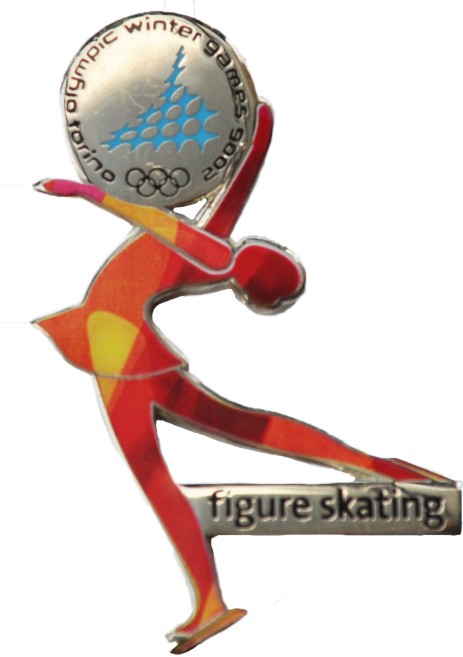
Le gare di pattinaggio di figura ai XX Giochi olimpici invernali si sono svolte dall'11 al 24 febbraio al Palavela di Torino.

PATTINAGGIO DI FIGURA: L'IMPERATORE SIBERIANO
Dicono sia diventato più aperto, più estroverso: forse è merito delle tante vittorie che, pur giovanissimo, ha già collezionato. Evgeni Plushenko, 23 anni siberiano, sui pattini da quando ne aveva 4, si è preso a Torino ciò che tutti sapevano fosse stato coniato per lui, l'oro nell'artistico uomini. Dopo tre Mondiali, cinque Europei e l'argento di Salt Lake 2002, ha messo in fila, con un punteggio da primato, lo svizzero Lambiel, iridato 2005 e il sorprendente canadese Buttle. E ha saputo svelare, sulla pista del Palavela, la seducente incarnazione del pattinatore di figura, metà atleta, metà artista (dal Rapporto Ufficiale del C.O.).

They say he's become more open and more extroverted. Perhaps all those victories he's collected over his short career have helped. Twenty-three-year-old Evgeni Plushenko of Siberia has been skating since he was four and at Torino took the medal that everyone knew had been cast for him and him alone: gold in the men's free skate. After three medals at the World Championships, five Europeans and silver at S.L.C. 2002, he swept aside 2005 World Champion Lambiel of Switzerland and a surprising Buttle of Canada to take his gold with a record-reaking score. His performance at the Palavela was the epitome of skating perfection: half athletic-half artistic.
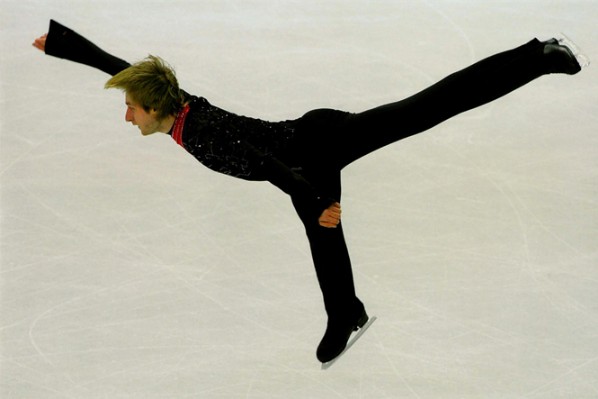
Poetry in motion: Evgeni Plushenko in the men's free skate on 16 February in which he later took gold
PATTINAGGIO DI FIGURA: LA SORPRESA ARAKAWA
Si chiama Arakawa Shizuka e passerà alla storia per essere la prima giapponese ad aver vinto il titolo Olimpico nel pattinaggio femminile. È la punta di diamante di un movimento che sta lavorando molto per raccogliere oro dal ghiaccio e che ha nuove stelle che si preparano a sorgere. Campione del Mondo 2004, innamoratasi del pattinaggio da bambina per la bellezza dei costumi indossati in pista, la ventiquattrenne di Miyagi ha incantato sulle note, premonitrici, del "Vincerò" dal Nessun dorma di Giacomo Puccini, precedendo la statunitense Cohen e la russa Slutskaya, principale favorita.

Her name is Arakawa Shizuka, and she will go down in history as the first Japanese winner of a women's skating gold. Shizuka is the spearhead of a movement working fat out to mine gold from ice and which boasts amongst its members a host of stars in the making. The 2004 World Champion first got involved with the sport as a child after falling in love with the costumes worn by figure skaters. Now 24, the Miyagi native enchanted judges and audience alike with her interpretation of Giacomo Puccini's "Vincerò" from Nessun Dorma, to finish ahead of Cohen of the United States and main favourite Slutskaya of Russia.
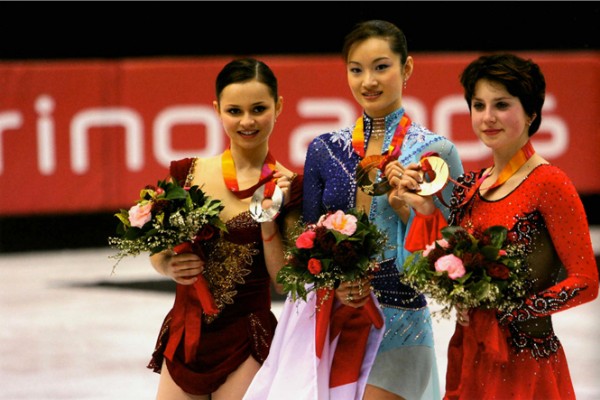
Three smiling faces on the women's figure skating podium: Cohen of the Usa (silver), Arakawa of Japan (gold) and Slutskaya of Russia (bronze)
PATTINAGGIO DI FIGURA: DODICI SIGILLI
Il dodicesimo sigillo: è quello impresso dalla coppia russa Tatiana Totmianina, ventiquattrenne avviata bambina al pattinaggio dalla madre istruttrice e Maxim Marinin, 28 anni, passato all'artistico a coppie dopo la delusione di una sconfitta individuale contro Plushenko, più giovane di lui di cinque anni. Dodicesimo sigillo perché è da dodici Olimpiadi che l'oro di questa specialità finisce regolarmente a sovietici e russi. Ultimi a spezzare l'incantesimo furono infatti i canadesi Wagner e Paul nell'edizione di Squaw Valley datata 1960 (dal Rapporto Ufficiale del C.O.).

The twelfth title was taken by the Russian pair consisting of 24-year-old Tatiana Totmianina and 28-year-old Maxim Marinin. The former learned her craft from her instructor mother, while the latter moved over to pairs after being defeated in the singles by the much younger Plushenko. Twelfth because for the last 12 Olympic Winter Games, gold in this speciality has been won by either the Ussr or the Russians. The last duo to break the spell was Wagner and Paul of Canada at Squaw Valley in 1960.
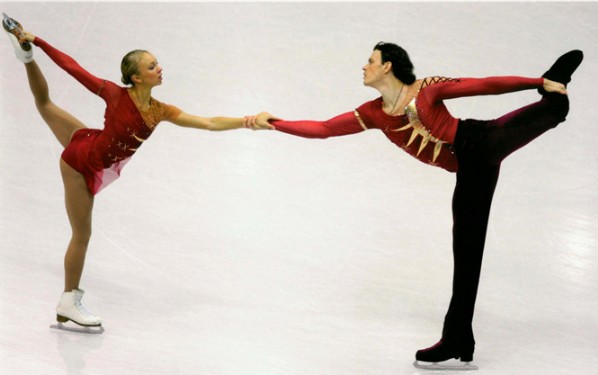
Tatiana Totmianina and Maxim Marinin of Russia during the free dance, in which they won gold
La leadership russa nel pattinaggio artistico è confermata anche dal successo nella danza su ghiaccio della coppia formata da Tatiana Navka e Roman Kostomarov, Campioni del Mondo 2004 e 2005. Ma nella memoria degli appassionati resterà lo sguardo interminabile - carico di rabbia, frustrazione, incredulità - fra i veterani azzurri Barbara Fusar Poli e Maurizio Margaglio dopo la caduta che li ha traditi a pochi secondi dalla fine del programma originale. Un errore pagato con il brusco risveglio dai sogni di medaglia (dal Rapporto Ufficiale del C.O.).
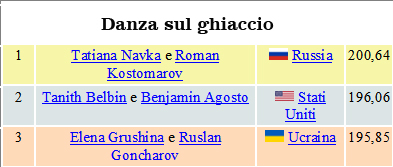
Further confirmation of Russia's supremacy in figure skating came in the form of 2004 and 2005 World Champions Tatiana Navka and Roman Kostomarov's win in ice dancing. But fans will never forget the furious, frustrated and incredulous look that passed between Italian veterans Barbara Fusar Poli and Maurizio Margaglio after the fall that crushed their medal hopes just a few seconds from the end of the original programme. An error they paid for with a sharp dose of reality as they awoke from their dreams of triumph.
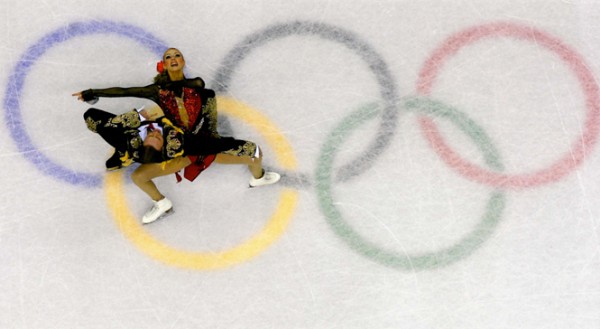
These two are about to win the ice dancing gold: Tatiana Navka and Roman Kostomarov of Russia, immortalised here during the free skate on 20 February